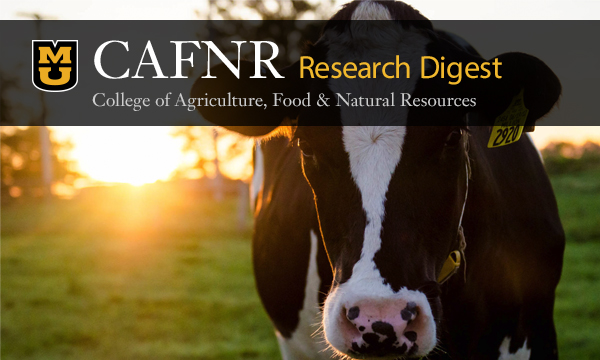|
Company founded on CAFNR technology has impressive IPO
A plant-based protein technology developed by researchers in CAFNR’s Division of Food Systems and Bioengineering helped lead to the formation of Beyond Meat, a company that recently had the best initial public offering (IPO) debut this year. The technology was created by Fu-Hung Hsieh, professor emeritus of bioengineering and food science. Although Beyond Meat’s headquarters are in California, its plant is here in Columbia, Mo.
FY2018 CAFNR Patents
For the seventh year in a row, the UM System was included in the Top 100 Worldwide Universities Granted U.S. Patents report. The analysis shows the UM System, with its universities in Columbia, Kansas City, Rolla and St. Louis, moved up 10 positions in the past year, ranking 60th compared to 70th last year. The ranking is based on data from the U.S. Patent and Trademark Office for the number of utility patents granted during the calendar year. CAFNR had 10 inventors with nine issued patents and 25 inventors with licensed technologies during FY2018:
- Kevin D. Gillis, bioengineering (Patent No. 9,862,697 – Patent No. 9,696,275)
- David Alan Grant, bioengineering (Patent No. 9,827,323)
- Sheila A. Grant, bioengineering (Patent No. 9,827,323)
- Li-qun (Andrew) Gu, bioengineering (Patent No. 9,732,379)
- Jae Wan Kwon, electrical and bioengineering (Patent No. 9,805,928)
- Peter P. Motavalli, natural resources (Patent No. 9,898,016)
- Kelly A. Nelson, plant sciences (Patent No. 9,898,016)
- Randall S. Prather, animal sciences (Patent No. 9,783,779 – Patent No. 9,807,987 – Patent
No. 9,820,475)
- Kevin D. Wells, animal sciences (Patent No. 9,820,475)
- Kristin M. Whitworth, animal sciences (Patent No. 9,820,475)
CAFNR faculty members have received the following recent grants (listed by Principal Investigator):
Sougata Bardhan, Spatial Variability of Soil Greenhouse Gas Emissions and Soil Microbial Diversity and Function in Conventional and Alternate Land Use Systems in Floodplain Soils, 3/1/2018 – 2/28/2021, $36,700, Lincoln University
Kaitlyn Bissonnette, Evaluation of BASF SCN Seed Treatment Products, 5/1/2019 – 12/31/2019, $9,660, BASF Corp.
Kevin Bradley, Chemical Materials Trial/Protocol NA19F7B001H, 4/1/2019 – 6/1/2020, $6,000, Dow AgroSciences
Kerry Clark, SIL MRA2, 2/1/2019 – 3/31/2020, $151,183, University of Illinois
David Diamond, A Riparian and Wetland Habitat Map for New Mexico (RwetMap NM), 7/1/2018 – 6/15/2020, $66,803, University of New Mexico
Daniel Downing, Reservoir Observer Student Scientists (ROSS): Engaging Youth in Harmful Algal Bloom Monitoring, 4/2/2019 –
4/30/2020, $14,994, University of Wisconsin Madison
James English, Acquisition of Goods and Services – 966 Admin Cost, 4/1/2019 – 3/31/2020, $42,508, Agricultural Research Service
James Heiser, Protocol DEV-H-2019-US-LJ1-A, 4/5/2019 – 3/1/2020, $9,500, BASF Corp.
Jessica Kansman, Indirect effects of drought on the biological control of aphids by parasitic wasps, 6/1/2019 – 5/31/2021, $116,859, National Institute of Food and Agriculture
David Korasick, Investigating the Structural Basis of Soybean Cyst Nematode Infection, 5/15/2019 – 5/14/2021, $159,797, National Institute of Food and Agriculture
Chung Ho Lin, Ecophysiology, ecosystem services, and environmental education of short rotation woody crops grown for phytotechnologies, 5/13/2019 – 9/30/2023, $84,000, Forest Service
John Lory, MU Certified Strip Trial Initiative: Cover Crop Trials, 10/1/2019 – 2/1/2021, $73,150, MO Soybean Merchandising Council (MSMC)
Matthew Lucy, Uterine microbiome: Functional significance in establishing the uterine program postpartum, 8/15/2018 –
4/30/2020, $321,625, National Institute of Child Health and Human Development
Blake Meyers, Support for GRA/Aleksandra Beric, 6/1/2016 – 5/31/2021, $66,015, Donald Danforth Plant Sciences Center
Gerald Miller Jr., Evaluation of BASF Experimental Compounds for Turfgrass Disease Control, 4/1/2019 – 12/31/2019, $15,000, BASF Corp.
Kelly Nelson, Field Evaluation of PhotoSeed™ and SunZoil™ Traits, 4/1/2016 – 2/28/2022, $256,657, Zeakal Inc.
Jennifer Reidy, Abundance, Survival, And Viability of Golden-Cheeked Warbler on Balcones Canyonlands Preserve, Austin, TX, $39,032, Forest Service
Reid Smeda, Chemical Materials Trial/Protocols NA19T8B021H; NA19T8B022H; NA19T8B023H; NA19T8B008H; and NA19T8B009H, 4/1/2019 – 10/31/2019, $24,000, Dow AgroSciences
Jinglu Tan, Acquisition of Goods and Services – CSWQ FY20, 4/1/2019 – 3/31/2020, $284,900, Agricultural Research Service
Kevin Wells, Swine Somatic Cell Genome Editing Center, 6/1/2019 – 5/31/2020, $1,129,562, National Institutes of Health Office of the Director
William Wiebold, Syngenta Service Order: April 10, 2019, 4/10/2019 – 4/9/2020, $9,779, Syngenta Seeds Inc.
Christopher Willig, Characterization of Plant Developmental Genes for Their Ability to Promote Somatic Embryogenesis in Monocot Crops, 5/15/2019 – 5/14/2021, $119,893, National Institute of Food and Agriculture
Jianfeng Zhou, Develop an efficient fruit handling system for elderberries, 5/1/2019 – 4/30/2021, $39,913, University of Minnesota
Provided by the MU Office of Research
|
